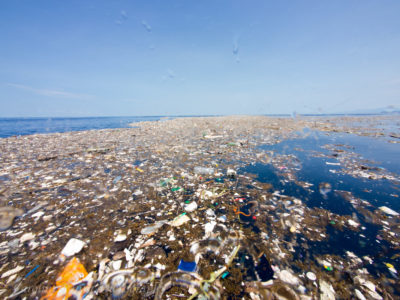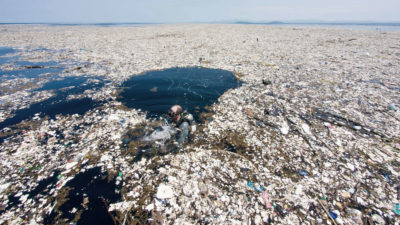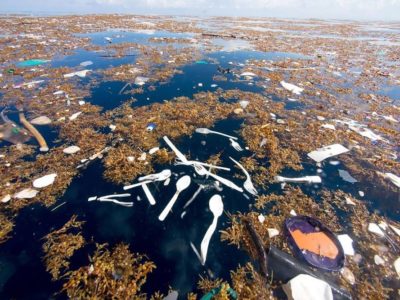
Beautiful beaches by the Caribbean are literally drowning in a “sea of plastic and styrofoam.” Caroline Power, an underwater photographer has been determined to dedicate her career showing how plastic waste is damaging the planet’s oceans.
She captured a truly haunting image in between Roatan and Cayos Cochinos Islands, off the Honduran coast that was blanketed with plastic forks, bottles and all kinds of rubbish. The worst off area that the dive team encountered was 15 miles away from the coast of Roatan, headed towards the Cayos Cochinos Marine Reserve.
“We were on a dive trip to a set of islands that don’t quite break the ocean surface. They are one of the most pristine dive sites in this part of the Caribbean,” Power told the Telegraph.
She mentioned them going through floating garbage for “nearly five miles”, adding: “Everywhere we looked, plastic bags of all shapes and sizes: chip bags, ziplocks, grocery, trash, snack bags, other packaging. Some were whole and the rest were just pieces. Sadly, many turtles, fish, whales, and seabirds will mistake those bits of plastic for food.”

“We then reached an area about two miles wide that had multiple trash lines that stretched from horizon to horizon. There was also a seemingly infinite number of plastic forks, spoons, drink bottles, and plates. There were broken soccer balls, toothbrushes, a tv, and so many shoes and flip flops.”
“To see something that I care so deeply for being killed, slowly choked to death by human waste was devastating. Once the trash is in the ocean, it is incredibly difficult and costly to remove. The key is to stop the trash before it enters the ocean,” said Power.
She also added that “in order for that to happen, we need to improve waste management, environmental education and recycling facilities on a global scale. This is a developed nation (first world) problem as well.”
Caribbean beaches hold three times more trash than any other average beach. Single-use plastics were found to make up one out of three in the litter, and plastic bottles were also too many to count. The sea itself has an approximate 200,000 pieces of plastic floating in every kilometer square. Its dirty water, combined with all the litter being washed up on shore makes it a perfect breeding ground for insects that carry diseases such as Dengue fever.

Blue Planet Society, an organization that campaigns for the end of overfishing and overexploitation of oceans said that the rubbish found in these islands originated from the Motagua River in Guatemala, and brought by the ocean during heavy rains.
“Trash from Motagua River in Guatemala polluting Honduras coast has been an issue in the region for some time. There is a lack of infrastructure and education, so many people either burn trash or throw it into rivers,” adds Power.
Because tourism accounts for 15% of the regions economy and all this trash and pollution is putting their tourism sector at risk, these small countries are starting to clean up their once pristine beaches. According to the UN Environment, 14 countries have already banned the use of plastic bags. The government have also come out with more policies to lessen plastic use and recycle, in order for a circular economy to work.
To help the region and their efforts to conserve nature and its beaches, you can donate to the Roatan Marine Park, a non-protect organization that protects the islands fragile coral reefs.
What are your thoughts? Please comment below and share this news!
True Activist / Report a typo


